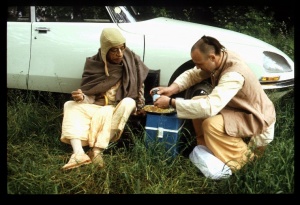CC Madhya 22.111: Difference between revisions
m (1 revision(s)) |
No edit summary |
||
| Line 1: | Line 1: | ||
{{ | [[Category:Sri Caitanya-caritamrta - Madhya-lila Chapter 22|C111]] | ||
<div style="float:left">'''[[Sri Caitanya-caritamrta|Śrī Caitanya-caritāmṛta]] - [[CC Madhya|Madhya-līlā]] - [[CC Madhya 22|Chapter 22: The Process of Devotional Service]]'''</div> | |||
<div style="float:right">[[File:Go-previous.png|link=CC Madhya 22.110|Madhya-līlā 22.110]] '''[[CC Madhya 22.110|Madhya-līlā 22.110]] - [[CC Madhya 22.112|Madhya-līlā 22.112]]''' [[File:Go-next.png|link=CC Madhya 22.112|Madhya-līlā 22.112]]</div> | |||
{{CompareVersions|CC|Madhya 22.111|CC 1975|CC 1996}} | |||
{{RandomImage}} | |||
==== TEXT 111 ==== | ==== TEXT 111 ==== | ||
<div | <div class="verse"> | ||
mukha-bāhūru-pādebhyaḥ | :mukha-bāhūru-pādebhyaḥ | ||
puruṣasyāśramaiḥ saha | :puruṣasyāśramaiḥ saha | ||
catvāro jajñire varṇā | :catvāro jajñire varṇā | ||
guṇair viprādayaḥ pṛthak | :guṇair viprādayaḥ pṛthak | ||
</div> | </div> | ||
| Line 14: | Line 18: | ||
==== SYNONYMS ==== | ==== SYNONYMS ==== | ||
<div | <div class="synonyms"> | ||
''mukha''—the mouth; ''bāhu''—the arms; ''ūru''—the waist; ''pādebhyaḥ''—from the legs; ''puruṣasya''—of the supreme person; ''āśramaiḥ''—the different spiritual orders; ''saha''—with; ''catvāraḥ''—the four; ''jajñire''—appeared; ''varṇāḥ''—social orders; ''guṇaiḥ''—with particular qualifications; ''vipra-ādayaḥ''—brāhmaṇas, etc.; ''pṛthak''—separately. | |||
</div> | </div> | ||
| Line 21: | Line 25: | ||
==== TRANSLATION ==== | ==== TRANSLATION ==== | ||
<div | <div class="translation"> | ||
" 'From the mouth of Brahmā, the brahminical order has come into existence. Similarly, from his arms the kṣatriyas have come, from his waist the vaiśyas have come, and from his legs the śūdras have come. These four orders and their spiritual counterparts [brahmacarya, gṛhastha, vānaprastha and sannyāsa] combine to make human society complete. | |||
</div> | </div> | ||
| Line 28: | Line 32: | ||
==== PURPORT ==== | ==== PURPORT ==== | ||
<div | <div class="purport"> | ||
This verse and the next are quotations from Śrīmad-Bhāgavatam ([[SB 11.5.2-3]]). | This verse and the next are quotations from [[Srimad-Bhagavatam|''Śrīmad-Bhāgavatam'']] ([[SB 11.5.2|11.5.2-3]]). | ||
</div> | </div> | ||
__NOTOC__ | |||
<div style="float:right; clear:both;">[[File:Go-previous.png|link=CC Madhya 22.110|Madhya-līlā 22.110]] '''[[CC Madhya 22.110|Madhya-līlā 22.110]] - [[CC Madhya 22.112|Madhya-līlā 22.112]]''' [[File:Go-next.png|link=CC Madhya 22.112|Madhya-līlā 22.112]]</div> | |||
__NOTOC__ | |||
__NOEDITSECTION__ | |||
Revision as of 12:57, 11 September 2021

A.C. Bhaktivedanta Swami Prabhupada
TEXT 111
- mukha-bāhūru-pādebhyaḥ
- puruṣasyāśramaiḥ saha
- catvāro jajñire varṇā
- guṇair viprādayaḥ pṛthak
SYNONYMS
mukha—the mouth; bāhu—the arms; ūru—the waist; pādebhyaḥ—from the legs; puruṣasya—of the supreme person; āśramaiḥ—the different spiritual orders; saha—with; catvāraḥ—the four; jajñire—appeared; varṇāḥ—social orders; guṇaiḥ—with particular qualifications; vipra-ādayaḥ—brāhmaṇas, etc.; pṛthak—separately.
TRANSLATION
" 'From the mouth of Brahmā, the brahminical order has come into existence. Similarly, from his arms the kṣatriyas have come, from his waist the vaiśyas have come, and from his legs the śūdras have come. These four orders and their spiritual counterparts [brahmacarya, gṛhastha, vānaprastha and sannyāsa] combine to make human society complete.
PURPORT
This verse and the next are quotations from Śrīmad-Bhāgavatam (11.5.2-3).